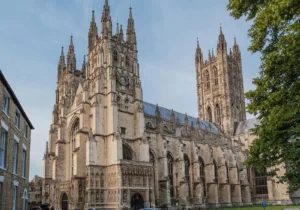Years ago, A.E. Housman penned a searing poem about a young man’s death. “To an Athlete Dying Young” begins with a celebration of his earlier feats:
The time you won your town the race
We chaired you through the market-place;
Man and boy stood cheering by,
And home we brought you shoulder-high.
But when the poet writes, that day is gone. The athlete’s race is run. The people carry him, “shoulder-high,” not in the exaltation of life, but in the grief of death:
Today, the road all runners come,
Shoulder-high we bring you home,
And set you at your threshold down,
Townsman of a stiller town.
I thought of these elegiac words recently when I heard of a pastor dying young. John Powell was a godly man known for his cheerfulness, gentleness, and selflessness. He was happily married to Katherine and the loving father of four children (two boys, two girls). I knew John when we both served at Boyce College in Louisville, Kentucky. John was the director of admissions but went beyond his job to strengthen those around him. As one example, he took several students aside, trained the young men to change their cars’ oil, and did so with an encouraging demeanor. He modeled and taught godly manhood, manhood lived in the power of Christ for others, with a smile and a certain glint in his eye.
John and I were not close friends, but with the campus broadly, I liked him and greatly respected his character. For this reason, it did not surprise me to learn this past weekend that John had purchased a truck to work on as a family project. Late Saturday night, he was driving to Missouri (he was from Kansas City) to get the truck with a friend when he apparently encountered a car on fire, having come to a stop in the middle of the Texas road. According to reports, John pulled over, just as other drivers did. But John and his friend were the ones who rushed toward the car, acting quickly to offer help. Details are still emerging, but John’s action saved at least one life.
This is not why I heard about this event, however. As John went to work, an 18-wheeler approached the car, and he had just enough time to urge his friend to get out of the way before the 18-wheeler struck John, killing him. John put himself in harm’s way. He acted on instinct to help. He ran toward the chaos, not away from it. Courage sent him into the darkness, and in the darkness, he lost his life.
As I think about this tragic moment, I cannot help but consider our culture’s discussion of manhood. What does manhood mean? Is it good for men to step up and lead, or should they quiet down and lean back? Are men inherently “toxic”? There is much to say about such matters, but John’s example cuts through the vitriol and stereotypes. It reminds me personally of what many of us strive to teach our sons to be. John was not a play-it-safe type. As I see him in memory, he is walking briskly, alert and active, greeting others cheerfully before moving swiftly on his way. In sum, John used his manly strength and aggressiveness for the good of others, not against them. He was Christlike in this way. Jesus the true man laid down his life for his bride, the church, making atonement for all her sin (Ephesians 5:22-33). Manly headship in the image of Christ does not mean selfishness; it means using one’s agency for the good of one’s wife and family.
This mandate goes beyond the home. Biblical manhood is manhood for others. It is seen in Eric Liddell, leaving fame and riches to go to the mission field in China. It is seen in William Wilberforce, fighting slavery for decades in the high halls of Parliament. It is seen in the “mighty men” of King David, men who did things like going into pits and slaying fearsome warriors that menaced the innocent of Israel (2 Samuel 23). It is seen whenever a man rejects the allurements of sin, trusts Christ, and disdains the passivity, self-focus, and childishness of modern Western culture in order to kill his sin, pursue purity, build a family as God calls him, develop a vocation as a provider, and by divine grace strengthen and protect his home, church, and community.
This is what John Powell stood for. He was popular and profiled by his seminary, but he was not famous. Now, in his death, word of his selflessness will go far. Yet though his is an exceptional story, John did not die doing something strange for him. He died in the night doing what he did in the day. Our world today often feels bereft of such actional humility. It feels increasingly desperate, divided, and every-man-for-himself. Yet many out there light a candle and reach out in love to others. This is what John, as I read him from a distance, did.
The cessation of such a life feels shattering. It is right and even good to grieve, and grieve deeply (Romans 12:15). As noted above, this is the tenor of Housman’s poem, with a restrained mournfulness that is almost unbearable to consider:
And set you at your threshold down,
Townsman of a stiller town.
But this beautiful elegy, though capturing the sadness of death, is not the final word for Christians. There is a greater truth at work because Christ was raised from the grave for us (Romans 6:5; 2 Corinthians 4:14). John Powell’s life has ended, but he is not in “a stiller town,” ultimately. John is alive. The resurrection is real. He has met his maker and redeemer face to face. He is in the realm of joy, the land where there are no shadows, the living city.
Just as he did in his life, John has left us an example. He was not perfect, but his redeemed life tells us a story of selflessness, kindness, and bravery in the face of great danger. The pastor dying young is gone, and his loss is a sharp cut. But unlike the memorialized athlete, John’s day of glory is not a memento of the past. His day of glory, of reward for a life well-lived in God’s power, has just begun.
***
After John’s shocking death, a GoFundMe page was set up by friends of John. All contributions will go directly to John’s wife and family. Because of the outpouring of love and support, the campaign target has changed several times; there is still time to give as you are able.





